- Home
- M G Vassanji
The Gunny Sack Page 7
The Gunny Sack Read online
Page 7
Early one morning the whole village was woken by a tremendous racket: there were the sounds of rifle-shots and the continuous rat-tat-tat of machine guns; there were shouts and screams in the vicinity, the thumps of booted feet outside, desperate knocks on doors that went unanswered. The two forces had finally met; or so the villagers thought. Some time later there was complete silence. Then the natives started coming in and familiar, reassuring sounds returned. Front doors were opened and enquiries rang out. The people of Rukanga heard about the ignominious defeat of the British force. The smaller German force, it was said, had used the aid of bees; and there are no fighters more ferocious than bees. The British troops with their inexperienced foreigners had simply walked into a forest of beehives, was the other interpretation. Whatever the case, the bees had routed the British, who had fled in terror in all four directions firing guns and screaming and banging on doors. By sunrise most of the British force had disappeared into the bushes or been captured. Foreigners always learn the hard way, people would later say. With such weapons are battles won in Africa. The Germans have learnt well.
But German triumph was short-lived. The routed British force was only a tip of a protracted British advance on eastern Tanganyika. One month later, as the family finished supper, a knock came on the door. As usual, nobody in the house stirred. Then a tired voice came: “Gulam Bhai, it’s me. My father has called a meeting of all heads of households. Come now.” It was the Rukanga mukhi’s son.
Gulam was let in through the side door into the mukhi’s courtyard. A lamp was burning in a corner. A group of men were sitting on the floor in a loose circle; in the middle was an Indian soldier in khaki drill, drinking tea from a saucer.
“This man brings a message from the British commander,” said the mukhi. “His name is Hari. He says Dar es Salaam is taken by the British. We must proceed and report there.”
“But it’s not safe to travel,” argued one of the men.
“Aré, yar,” said Hari, “if you don’t hasten, there will be no place to go. Listen, you are my brothers. Please. I beg you. You must go. Besides, it’s the commander’s order. You are British subjects, you must obey. There is going to be fierce fighting here.”
“Like last time,” grinned the mukhi.
“Yes, yes, what fierce fighting!”
With one of their own, the men felt braver than usual.
“No jokes,” said Hari sharply. “This is the commander’s order. If you don’t go, we are not responsible for your safety. Tomorrow we attack. This town has supplies and shelter, which the Germans might go for. And don’t take your shops with you; if you are seen not carrying anything, you might not be attacked.”
He stood up, gave a fierce look around, and left.
Among the trading immigrant peoples, loyalty to a land or a government, always loudly professed, is a trait one can normally look for in vain. Governments may come and go, but the immigrants’ only concern is the security of their families, their trade and savings. Deviants from this code come to be regarded and dismissed as not altogether sound of mind. Of the ten store-owning families in Rukanga, seven were Indian; six packed up and were ready to leave by dawn. Again, the gunnies stuffed with one-rupee notes, the jewellery tied around their waists; once more the promises of returning, the hiring of men to watch over what was left behind. But in the mukhi, the Germans had a friend; he had supplied the boma while it was in use and it turned out that he still supplied its former inhabitant, the German captain, in the bush. The mukhi stayed; and so did Gulam’s brother Abdulla, who had learnt German in Bibi Wasi’s classroom in Matamu and become Germany’s lifelong friend.
The road to Dar es Salaam was uneventful. They stayed close to the railway line and after some time saw a train. They also saw motor vehicles and troops moving west and hailed, “Biritish, zindabad! Rani Victoria, zindabad!” At the end of the second day, the sun behind them, they finally came upon the famous Bagamoyo Strasse. It was just as Dhanji Govindji had described to Ji Bai in Matamu. They passed several miles of African huts, before finally reaching the first Indian shops at Sultan Strasse and Sheth Samji’s busy depot at Ring Strasse. They stayed at Sheth Samji’s for the night. The next day they toured the entire Indian quarter and met friends and acquaintances, they gaped at the houses with parts of roofs blown away by British guns. The town was crowded and noisy, like a big market. The streets were packed with lorries and troops, horses and mules, and the air was filled with exhaust fumes and dust and rank odours. Tents filled the open spaces between buildings. They went to the seashore and admired the church and the white government buildings. They held their breath as they watched from a distance the governor’s palace, now fallen, being bombed by a British ship, and they gaped at the imposing statue of von Wissman who had long ago quelled one of the first revolts against the Germans. And when they returned in the afternoon and sat down with the sheth to discuss their future, they found themselves to have become penniless.
“Haven’t you heard?” the sheth said. “They are making fires out of it. It’s useless, this Deutsch Ost Afrika eine-rupee. The new Government and the banks will not honour it. What goods do you have?”
“None,” she said.
We had to start from scratch, borrowing and buying on credit, and we opened a small duka in the African section, selling kerosene by the jigger and packets of spice, and our fortunes never rose again, we were mukhis once, people called us Sharriffu, Germans called us Bwana, but for forty years and more we stayed poor, changing trades, trying this and trying that, moving from here to there. Collectors would shout and wave their hands, making sure the neighbours heard, and we would pay out of shame even if we had to borrow more money to do it. We blamed it on the sin of the old man, my father-in-law, but how can you blame an entire war on the sin of one man?
THE SUFFERING MUKHI.
Before he died Dhanji Govindji probably asked everyone for forgiveness but they laughed. What was his sin, Shehrbanoo, that could be equated to the ravages of war? Only now she begins to tell, to explicate the crime that Ji Bai herself would only hint at … now that the secrets of one green book are unlocked and the accounts of the past lie open …
From Dhanji Govindji Africa exacted a price, she says, nothing but his soul. Listen.
One morning (it is related) a pir and his murid went walking the hills together. The terrain was rocky, the day was hot, but the pir appeared tireless, taking his follower higher and farther as if to some pre-chosen destination. Presently they came upon a snake on a stone. It had been hit by a rock or a stick. It was writhing in agony, beating its head upon the stone first on one side and then the other, and crawling all over its wounded broken head was a swarm of black ants.
The pir and the murid stopped at the sight.
“What poor soul can this be, for what sin could he be punished like this?” the murid was moved to remark with pity.
“For the sin of stealing the wealth of the community entrusted to him,” replied the pir. “The snake is a former mukhi and the ants are his community come to torment him. He has been punished enough, I have come to release him.” So saying, the pir picked up a stone and put the snake out of its misery.
There is no sin greater, there is no shame deeper. But Dhanji Govindji, for the sake of his half-African son, committed it; dipped into community funds when his own savings had run dry, to pay his numerous informants and agents, to finance his quest. This was the sin Ji Bai mentioned, the guilt which they carried silently in their breasts, with the knowledge that there were people, there were families, who knew of it and could point their fingers at them. And perhaps … perhaps it was not the outsiders who had murdered him after all and there were people in Matamu who had sought revenge, or for the safety of their remaining funds had seen fit to act … and put the suffering mukhi out of his misery.
No wonder then, the mistrust of the past by Ji Bai’s family, the sons and grandsons of Gulam and his brothers. But Ji Bai knew better. There was more to the past than j
ust the sin.
Part 2.
Kulsum.
VIEW FROM THE BIRIJ.
Meet Kulsum: hemorrhoid sufferer, a TV commercial might dub her, with a suitable close-up of a woeful expression on an otherwise sprightly face. She will relate her sufferings in the most graphic detail to any stranger who shows the slightest interest. “These headaches,” she will start … “Once I get one it just doesn’t leave, simply incapacitates me.” “A couple of Aspros, perhaps,” the stranger might venture, not wanting to be drawn in but already in the net. “Oh, they have no effect,” she says, “too weak. I’ve had headaches since I was wee high. I’ve had glasses since then, too. I used to sew. Did Singer embroidery, you know; and was clever at it too, won prizes. And we used to do caps, decorate them until late at night, stitching sequins one after another until the eyes seemed to pop with the tension and the pain. And what did we get after all that work—two cents for a cap. Of course, our parents kept the money … we were poor, hardly had enough to eat, we all had to pitch in—why, chapatis were a luxury and we would jump for joy …” Our stranger gets impatient: “What do you take, then?” “Oh, nothing helps,” she answers. “But I take Panadol. And when I take Panadol, I constipate, and then my hemorrhoids start up.” The stranger is squirming now. He would do anything to get away from this imposed intimacy. “Indeed,” he ventures. “Oh, yes, I’ve had hemorrhoids since Salim here stayed in the stomach. They were so painful, his father brought a tube—you know, the tube of a tire, Dunlop—for me to sit on. And when I’d been to the lavatory my mother would fan me. My mother always came for my deliveries. After he was born, I could have had an operation to have them removed, but the doctor said it was risky.” “Eat vegetables,” the stranger finally ventures, hoping he’s out of the worst. “Oh, you think I don’t? I even don’t eat very much. Can’t.” The stranger starts breathing again.
She’s graduated from laxatives and purges, of which she’s tried all—milk of magnesia, epsom salts, senna, liquid mixtures, tablets, leaves, powders and chocolatey concoctions. Now she’s on to bran and fibre supplements. And in the belief that soft, refined foods will give her smoother motions, she avoids meat until she’s tempted by a plate of samosas or kebabs, and eats marmalade by the spoonful, has cake for lunch and—although she denies it—dislikes vegetables.
Kulsum. In our catalogue of names, where history moves in a noisy parade wearing faces like masks, Kulsum comes along with the generation of Sheru, Zera, Daulat, Rehmat … The generation that to the present age represents age, decay, death. A generation that embarrasses, which does not speak English, whose personal manners make us flinch … Men and women physically shapeless and retarded, old and dying at sixty.
Yet Kulsum was a flower once. And while still unplucked though in full blossom at sixteen, she stood behind the birij of her father’s shop one Mombasa morning and watched with curious eyes the conference of four adults in the front of the store. The birij was a wall-length wooden shelving that partitioned the store from the rest of the house, leaving room for a narrow, curtained doorway. Her nose stuck first inside one opening and then another in the birij, between piles of bright Indian-made kikoi and msuri, white Marikani no longer from America, and colourful khanga and black kaniki, catching whiffs of newly unpacked and still-unpaid-for cotton and feeling the fine dust over it. She strained her neck and ears to catch a trace of the solemn conversation now in progress in the shop. Below her, among the lower shelves, young Zarina did the same.
“Do you think it’s for Daulat?” asked Zarina, looking up.
Such lengthy discussions conducted with such quiet formality, such straining civility, between her parents and two strangers, so that the one or two customers who stepped in took heed of it and quietly stepped back into the street, could only be about one thing. Marriage.
Mitha “Diwano” Kanji had a problem on his hands; actually, he had seven problems. He had seven daughters (besides four sons), only one of whom, the eldest, Fatu, was married. After Fatu came Daulat, and then Kulsum. The proposal should have been for Daulat. But Kulsum with beating heart knew better.
One of the two women talking with her mother and father was Zera “Sopari” (betel-nut chewer) from the store across the road. The other was a tall, thin woman with a long nose and a serious face. Kulsum had seen them the previous day; that is why she knew. Fate had come to call. The future beckoned with all it held ready for her, and she would have to go. Yesterday morning, her mother had called her into the shop. “Kulsa, these women want to see your embroidery; go and bring something to show.” “Come here in the sun, beta, where we can see better,” Zera beckoned. But it was not her embroidery they wanted to see. Across the street in the shadows of Zera Sopari’s shop there was a movement; across the street a man got up from a bench, moved casually to the threshold and threw a glance across. A young woman of medium height, fair, and with spectacles on her round face. That’s all he saw. It was enough. Now they had come to bring the proposal.
“Kulsa,” her mother called as before. Kulsum walked in past the rag curtain and stood in front of the birij. At that moment there was a movement across the street and this time the man was framed by the sunlight. Instinctively Kulsum pulled her pachedi across her face, but not before giving one deep and curious look at what had been decided for her. Then she looked at her mother and went inside.
“But he’s so dark,” observed young Zarina from the floor, having watched through the birij.
My grandfather Mitha Diwano, Mad Mitha, was a deeply religious man of the unusual kind: one who practises simply and consistently what the rest profess. Often he would take his blanket and steal away into the night to spend the rest of it in the bosom of his true mistress. With great reverence he would emerge from the mosque walking backwards, so as not to show his back to it, taking twelve springy steps before turning around. And then, with his close-cropped white head stuck forwards, his white suit crumpled, he would stride home, bobbing up and down and muttering a prayer or singing a bhajan. At this time no emergency—no robber, policeman or fire—could have drawn a word from his mouth, until he had reached home and deposited his acquired merits on the household. He was taken by the rest of the people in Membeni in a light-hearted fashion. Beginning with his nickname, which they turned into Mitho Diwano for Sweet Madman, he was treated as a joke, a local phenomenon good for a few laughs. A devotee of his intensity they had only heard of in legends, and obviously could never take seriously in their midst. Businessmen delighted in enticing him with new stock, which he bought on the basis of a hundi signed to a bank; and when the maturation date approached and the stock languished on the shelves and behind the birij, his wife Hirbai would go around giving it away at discount to raise the money.
The Sweet Madman left Jamnagar in Gujarat with his brother and their wives a few years before the First World War. The two wives were also sisters. Mitha got off at British-protected Zanzibar, and his brother continued on to German-ruled Dar es Salaam. A few years after the war, with one daughter married and three others in line and with two sons, when life was hard and Zanzibar was too small a place to hold everybody, Mitha received a vision. And when Mitha had a vision, people listened, even those who normally ridiculed him. The vision told him that Zanzibar was doomed, that he should go to the mainland. When Mitha and his family took the boat to Mombasa, several other families went with them. They all set up shop in the bustling Indian quarter at Membeni.
My grandfather Mitha had a simple strategy for getting his daughters married. He accepted the first proposal that came. “We will not accept abuse,” he would tell his wife. This was because the proposal always said something like, “We would like your daughter to be our son so-and-so’s wife.” Having called his precious daughter “wife” and so put a smudge on her, my grandfather figured, they would have to accept her as a wife. Which they had come to do anyway. Thus my mother Kulsum almost instantly got engaged to my father Juma.
“But he is so dark,” said little Zar
ina at Kulsum’s side. Yes, he was dark. Not the dark of charcoal, the mweusi of the African from the interior, the Hehe, the Ngoni, the Haya; or the light dark mweupe of the Chagga; or the red-dark of the half-naked Masai, his arse showing firm and proud as he walked; but the dark of the Indian, the persistent brown-dark of sedimented coffee that refuses to whiten with any amount of milk. My father Juma was wearing white trousers and a white shirt in the European style when Kulsum first saw him, and he had on shiny brown leather shoes. His hair was glistening black and he sported a red scarf at the open shirt neck. “But he is smart,” said Kulsum, “and he is strong. He will pick you up and throw you away.”
It was 1938, and my father was thirty years old. He was, like his father Huseni many years before in Matamu, in the process of getting tamed.
Moti, the orphan bride, the fallen jewel of Matamu, my father’s mother: she had waited two years for her vanished husband Huseni, before marrying again and setting off to make family and fortune in Kenya. My father Juma was four years old and went with her. When she died in Voi a few years later, she was on her third marriage. Her husband packed off all her children—three daughters and Juma—to her sister, Awal, further up along the railway line in Nairobi and disappeared. Had Dhanji Govindji, who came looking for Huseni not long after, stuck around longer in Voi or even Mombasa, he might have traced his grandson Juma and perhaps taken him home; and the world would have been different.

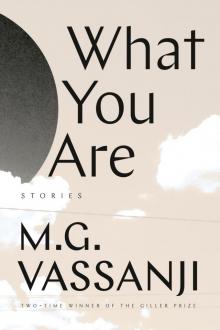 What You Are
What You Are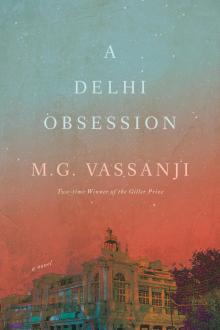 A Delhi Obsession
A Delhi Obsession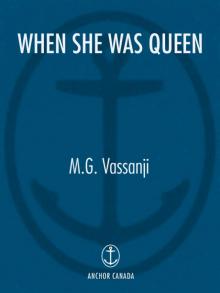 When She Was Queen
When She Was Queen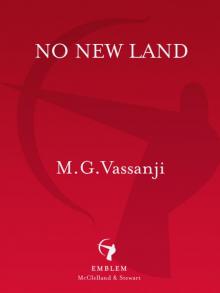 No New Land
No New Land Nostalgia
Nostalgia Mordecai Richler
Mordecai Richler The Book of Secrets
The Book of Secrets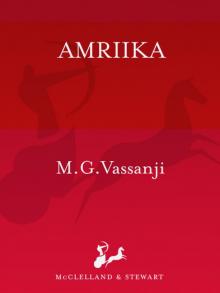 Amriika
Amriika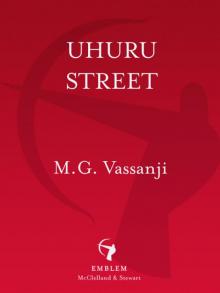 Uhuru Street
Uhuru Street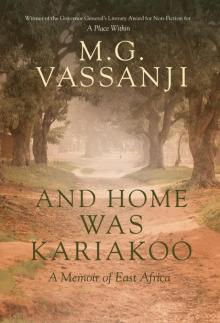 And Home Was Kariakoo
And Home Was Kariakoo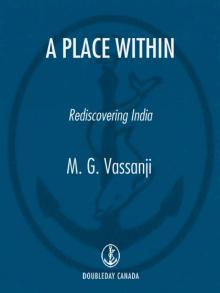 A Place Within
A Place Within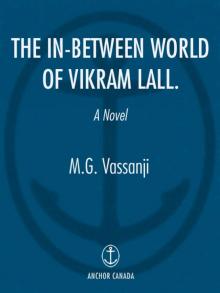 The In-Between World of Vikram Lall
The In-Between World of Vikram Lall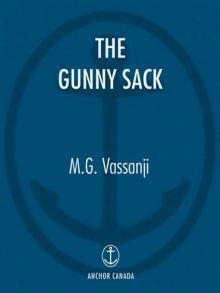 The Gunny Sack
The Gunny Sack